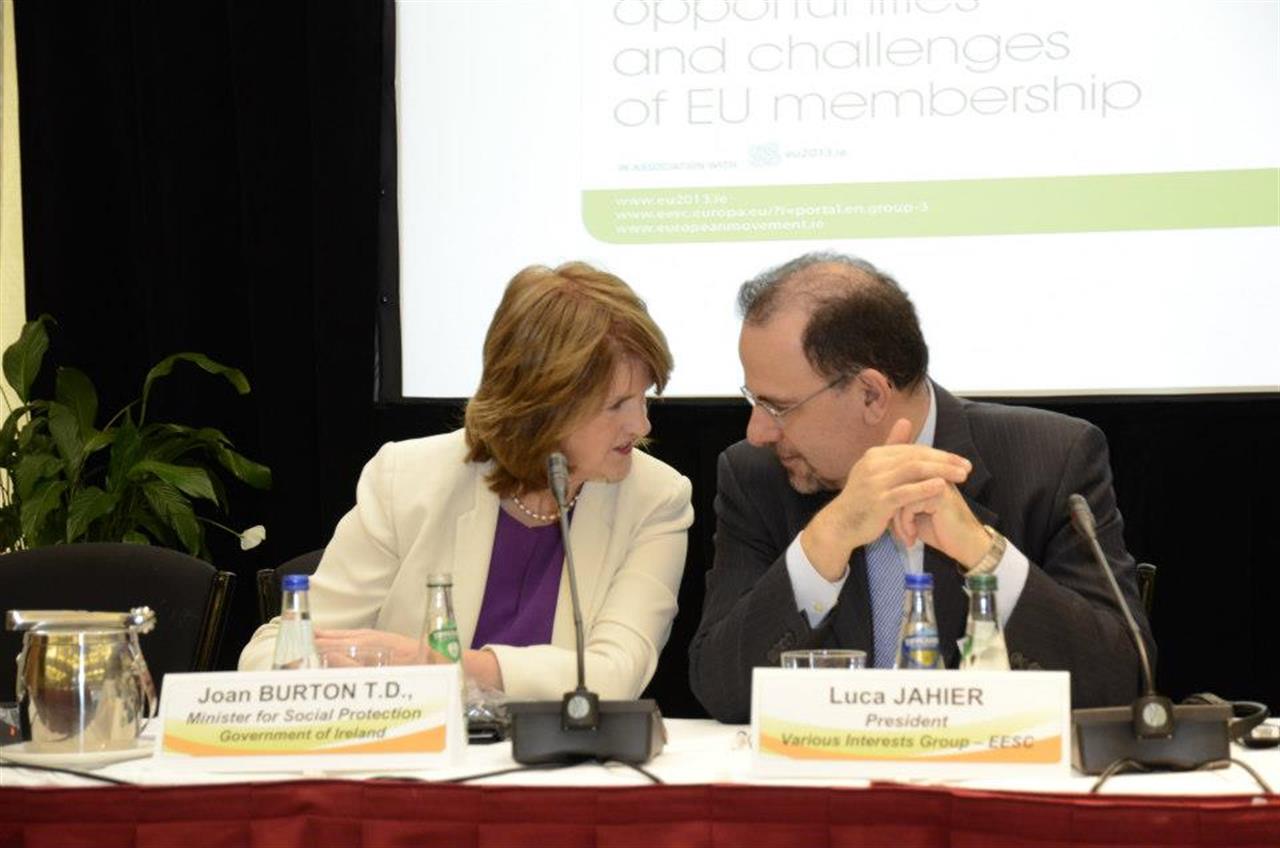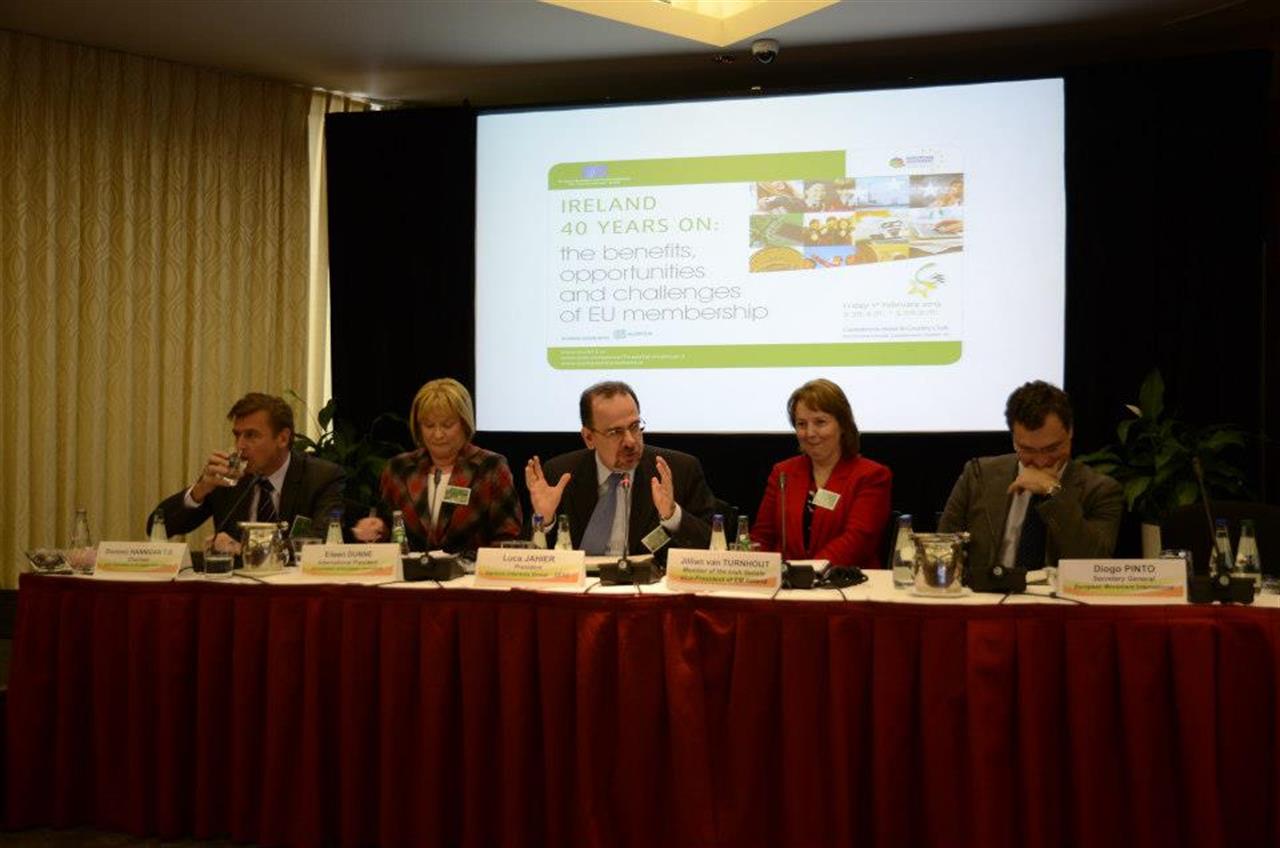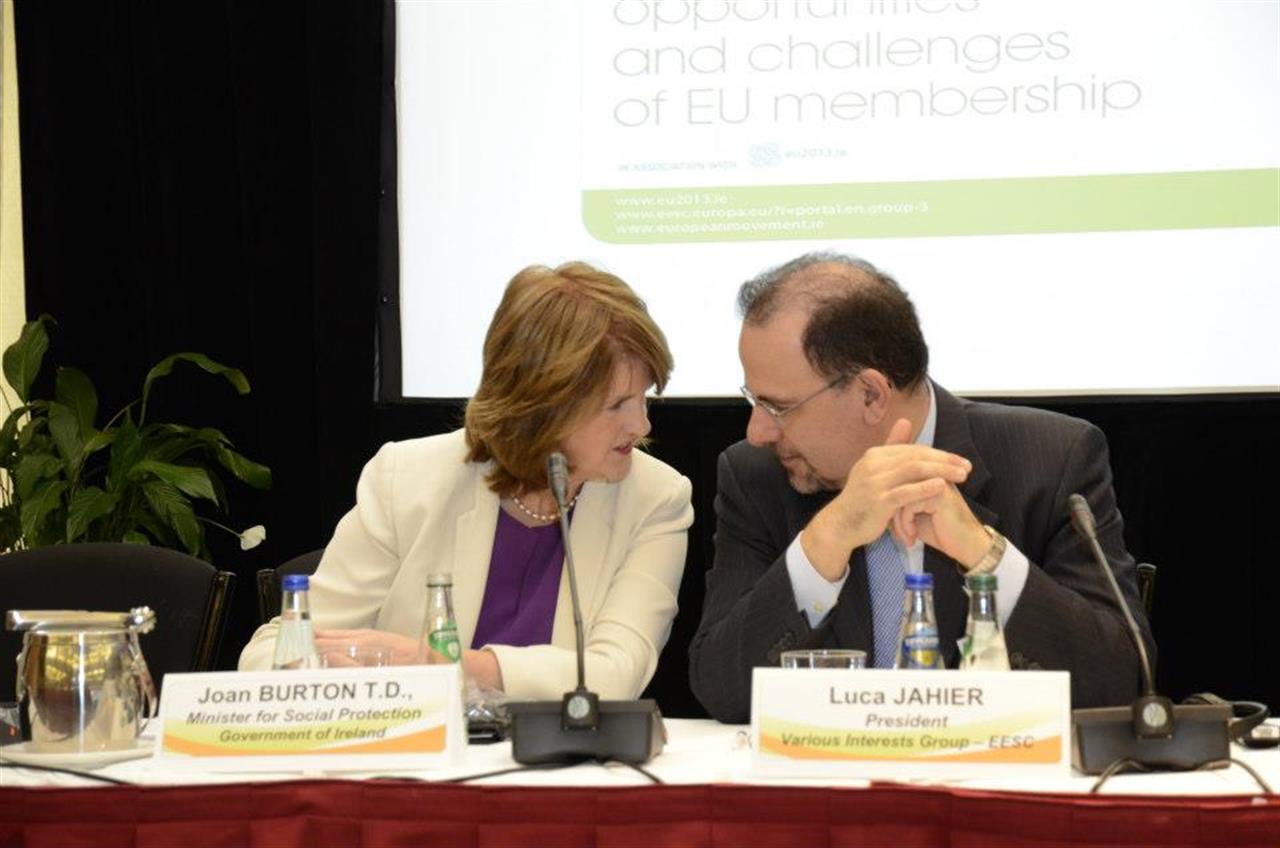
Dublino, 1 febbraio, nello splendido scenario del centro congressi di Castleknok, il Gruppo III del CESE ha organizzato una conferenza di alto livello in collaborazione con il Movimento Europeo Irlanda, per segnare iul 40° anniversario dell’adesione dell’Iralanda all’Unine Europea, nel quadro del semestre irlandese dell’Unine Europea e dell’Anno europeo dei cittadini. La Conferenza, presenti oltre 150 partecipanti, tra i quali molti esponenti della società civile irlandese, si è focalizzata principalmente su tre argomenti: il costo della assenza di Europa, l’Irlanda quale esempio di risposte alle sfide poste dalla crisi economica e finanziaria, la riforma della politica agricola comune, nel quadro del negoziato sulle prospettive finanziarie. Assiame al sottoscritto, hanno aperto la conferenza il Ministro della Protezione sociale, Joan BURTON T.D., e la senatrice Jillian van Turnhout, membro del Senato Iralabndese, già Vicepresidente del CESE. Di seguito il discorso introduttivo della conferenza, che è stata un indubbio successo.
http://www.eesc.europa.eu/?i=portal.en.events-and-activities-ireland-40
It is a great pleasure for myself and all members of the Various Interests Group of the European Economic and Social Committee to be here with you today in Dublin, to mark the 40 year anniversary of the accession of Ireland to the EU, which of course coincides with the Irish Presidency of the EU Council and the European Year of Citizens.
The topic of our conference today is ‘Ireland 40 years on: the benefits, opportunities and challenges of EU membership’. This is a subject that I consider to be very timely, in view of Europe’s ongoing economic, political and social crises, which have now reached their fifth consecutive year. Of course, our conference is also very timely given the recent challenging speech of a key European Prime Minister, the details of which are well known to all of us. Ad it is very interesting that here in Ireland you are celebrating this 40 anniversary looking for better ad further integration. But in the same anniversary, P.M Cameron says he strongly want UK continue to stay married with Europe, but with one key condition: to improve his staying alone….
But the result of this triple economic, political and social crises is on the one hand, a fervent attempt to make Europe and its architecture more effective, more resistant and more cohesive. On the other hand, there is a wave of fierce national criticism of the EU, there is rising demagogy and political extremism, alienation, mistrust and fear among Europe’s citizens. And of course, all of this is taking place against a backdrop of shamefully high levels of unemployment and poverty in Europe. For according to the latest figures from the EU statistical service, there are currently over 26 million Europeans unemployed, with levels in some countries reaching as high as 26% of the adult population. And in at least two Member States, youth unemployment is almost 57%. In addition, almost a quarter of the European adult population, some 116 million people are currently at risk of poverty and social exclusion. So clearly, we need to ask the questions: have we betrayed the European ambitions of a ‘smart, inclusive and sustainable growth’? Are we doing enough to ensure that there will be a European Union in the future?
In these turbulent times, the role of the Irish Presidency of the EU Council is important and explains why we decided to include a session entitled ‘Ireland as an example of how to cope with the challenges posed by the financial crisis’. For although the origin of the crisis in Ireland differs from that of other countries, there are still many lessons to be learnt by others. And Ireland should be strongly commended for its determined, stoic and effective policies to rebalance the economy. For although there has been deep austerity in Ireland, with rising unemployment, a return to emigration and perhaps even a brain drain for the country, it is also true that foreign direct investment flows have remained relatively strong and competitiveness has improved significantly. So the property bubble may have burst, but the Celtic Tiger has not been vanquished!
It is within this context that I personally very much welcome the statement that the Irish Presidency will be that of ‘…a recovery country driving recovery in Europe’. And I also very much welcome its moto of ‘stability, growth and jobs’, of a ‘people-centred recovery designed to last’. As Taoiseach Enda Kenny commented during the recent visit of Mr Barroso: ‘Ireland will be in the business of solutions’!
Among the ‘solutions’ that we hope to see is at least concrete progress towards an agreement on the EU’s budget for the next seven years, the famous Multi-Annual Financial Framework. And I say this despite the fact that there have recently been calls by some, for the introduction of annual EU budgets. But in any case, the EU budget should be centred on growth, employment and competitiveness. We also need progress on genuine economic and monetary union and a stronger investment in the social dimension of EMU, in time for the June 2013 meeting of the European Council. And we need to take concrete and rapid steps towards implementing the agreement for a Single Supervisory Mechanism and for the direct recapitalisation of Eurozone banks via the European Stability Mechanism. May I also add that I strongly support any attempts made by the Irish Presidency to persuade Member States that Irish banks should be recapitalised retrospectively from the European Stability Mechanism. The Irish taxpayer has already contributed too much towards the country’s recovery. And the EU should make every possible effort towards supporting the Irish authorities’ ambition of exiting Ireland from the EU/IMF bailout programme in 2013.
But above all, it is imperative that holistic solutions are found to Europe’s financial and economic crisis. The fiscal, banking and financial unions are necessary pillars of Economic and Monetary Union. But they must be complemented by growth and equity promoting measures, by employment creation, inter-generational solidarity, poverty reduction, the sustainable and efficient use of resources, territorial and social cohesion. And all of the above should be underpinned by political legitimacy and democratic accountability.
And if there is one area where we must rapidly find solutions, it is in employment creation, notably for youth and poverty reduction. And this must be done by supporting and strengthening the Single Market and the Europe 2020 Strategy, industrial policy, research and development and international trade. And the key actors in this process should be our SMEs, the social economy, the green economy, the liberal professions, etc. We must also invest and not regress in qualitative education, lifelong learning and enhanced mobility for Europeans. And above all, we need the right mix of consolidation and growth, in order to help our youth, Europe’s future…
And one way of creating jobs is of course through a revamped Common Agricultural Policy, and perhaps the crisis can be seen as an opportunity to revisit other sectors of Irish economic activity, notably farming. For agriculture currently constitutes 11% of the country’s exports and almost 8% of national employment. And with the expectation that a reformed CAP will come into effect next year, it is of no surprise that the Irish Presidency of the Council of the EU has announced that it would like to conclude these crucial negotiations during its six-month term of office.
Investing in a sustainable and effective CAP is without doubt in Europe’s interest. For after 50 years, CAP remains at the cornerstone of European integration and it continues to play a central role in European food security, growth, job creation and in the vitality of rural communities. For these reasons, it is recommended that the EU budget for CAP for the next seven years is maintained at the current levels and that it should support farmers who work and produce, rather than farmers who no longer produce. This is necessary in order to address future demand for food and increasing food prices, whilst also attracting younger generations to the vocation of farming. The second crucial element to the future CAP is of course the ‘greening’. CAP should most definitely support sustainable forms of agriculture, including national strategies such as the Irish Food Harvest 2020. However, the greening measures should not lead to excessive bureaucracy and additional costs for farmers. In contrast, the future CAP should be simplified, made more transparent, balanced, predictable and flexible, subject to effective financial and operational controls.
Ladies and gentlemen, my apologies for taking up so much time, but these subjects are complex and can lead to impassioned reactions. I am after all Italian! Not that the Irish can be accused of lacking passion! For in my humble opinion you are a very amiable people, very creative, but also resilient, efficient and very gifted speakers! So we have high expectations for your mediation skills during your Presidency!
Dear friends and colleagues, in 2013 Ireland is celebrating The Gathering, a call to the 70 million Irish Diaspora worldwide to rejoice in being Irish and to come together in events throughout the year. Perhaps we could make a parallel at the European level. Perhaps we could argue that Europe’s economic, political and social crises have led to a Gathering of the EU and of its Member States who in the last few years have realised the benefits, opportunities and challenges of EU membership! They have realised that it is a future worth fighting for!

Vuoi accedere all'archivio di VITA?
Con un abbonamento annuale potrai sfogliare più di 50 numeri del nostro magazine, da gennaio 2020 ad oggi: ogni numero una storia sempre attuale. Oltre a tutti i contenuti extra come le newsletter tematiche, i podcast, le infografiche e gli approfondimenti.

